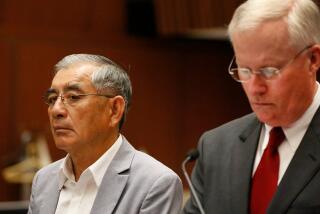Freddie Mac Is Fined $3.8 Million
- Share via
WASHINGTON — Home loan giant Freddie Mac agreed to pay a $3.8-million fine to settle allegations that it made illegal campaign contributions, the Federal Election Commission said Tuesday.
The fine is by far the biggest ever levied by the commission. Because the Federal Home Loan Mortgage Corp., widely known as Freddie Mac, agreed to pay the fine and stop breaking the law, the commission said it would not take action against corporate officials.
“We’re hoping this will catch people’s attention,” Commissioner Ellen Weintraub said, noting that campaign watchdogs have often called the regulator a do-nothing agency.
Freddie Mac was accused of illegally using corporate resources between 2000 and 2003 for 85 fundraisers that collected about $1.7 million for federal candidates.
Much of the fundraising benefited members of the House Financial Services Committee, a panel whose decisions can affect Freddie Mac.
The fundraisers were organized by then-Freddie Mac lobbyists Robert Mitchell Delk and Clark Camper, who described them to the corporation’s board as “political risk management,” the commission said.
The lobbyists told Freddie Mac officials that the fundraising effort was needed to help the company achieve its lobbying goals. Delk wrote in his 2001 performance appraisal that Freddie Mac had held more than 40 fundraisers for House Financial Services Chairman Michael Oxley, R-Ohio.
The commission also found that Freddie Mac officials used staff and resources to raise money from company employees to give to candidates, and that in 2002 the corporation itself gave $150,000 to the Republican Governors Assn., which ultimately returned the money.
U.S. law bans federally chartered corporations such as Freddie Mac from contributing to campaigns, and prohibits companies from using corporate resources and employees to help raise money for congressional and presidential candidates.
The election commission’s previous record fine was $849,000, levied against Audiovox in 2003 in a corporate contribution case.
The regulator opened an investigation of Freddie Mac’s fundraising after Public Citizen, a consumer advocacy group, filed a complaint in 2003 accusing Delk, his wife Amanda, Washington restaurant Galileo and political consulting firm Epiphany Productions of making illegal political contributions.
Public Citizen’s complaint said that the Delks made contributions higher than federal limits and that the restaurant and Epiphany made illegal corporate donations by providing services for the fundraisers.
The commission decided against taking action against Galileo or Epiphany.
More to Read
Inside the business of entertainment
The Wide Shot brings you news, analysis and insights on everything from streaming wars to production — and what it all means for the future.
You may occasionally receive promotional content from the Los Angeles Times.










